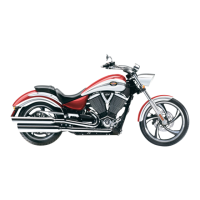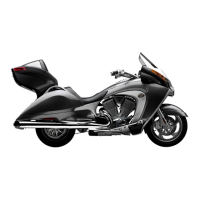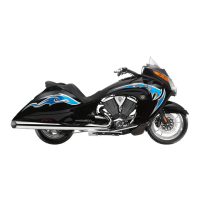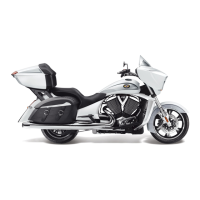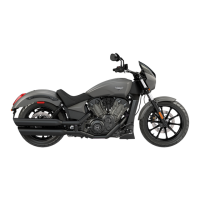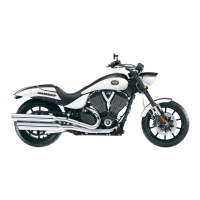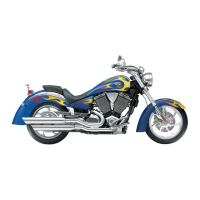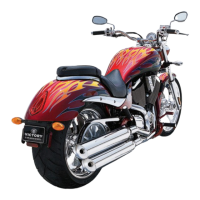Do you have a question about the Victory Motorcycles V92C and is the answer not in the manual?
Essential information for safe riding and proper maintenance of 2002 Victory motorcycles.
Explains signal words and symbols for safety and hazard indication.
Guidelines and design factors affecting how to ride the Victory motorcycle safely.
General practices for safe motorcycle operation, including pre-ride checks and skill awareness.
Instructions for safely carrying a passenger, including positioning and communication.
Recommendations for essential protective gear for riders to reduce injury risk.
Explains total weight limits for the motorcycle, operator, and passenger.
Guidelines for attaching cargo and accessories to maintain motorcycle stability and handling.
Guidelines for operating a motorcycle with saddlebags, including speed and weight limits.
Procedures for parking the motorcycle safely, including steering lock and hot components.
Instructions for safely transporting the motorcycle using trucks or trailers.
Information on how modifications can void warranty and affect safety.
Guidelines for choosing and mounting accessories to ensure safe operation.
Safety precautions for refueling and handling gasoline and exhaust fumes.
Requirements for keeping the motorcycle in top working condition through regular service.
Identifies the location of important safety and vehicle information labels on the motorcycle.
Procedure for reporting vehicle defects to NHTSA and Polaris Industries.
Details on locating and using the VIN for registration and parts ordering.
Information on the engine identification number's location and purpose.
How to find the ignition key identification number.
How the ignition key operates the steering lock and ignition switch.
How to use the steering lock to deter theft and prevent movement.
Functions of the ignition switch including Off, On, Park, and Seat Release positions.
Location and use of helmet holders under the operator's seat.
Overview of the instrument cluster components: speedometer, tachometer, and indicator lights.
Explanation of various indicator lights and their meanings.
How to use the MFD to view odometer, trip odometer, clock, fuel gauge, etc.
Controls located on the left handlebar, including fast idle, headlamp, turn signals, and horn.
Controls on the right handlebar, including engine stop/run, emergency flashers, starter button, and throttle grip.
Controls gear changes for the five-speed transmission.
Engages the rear brake.
Instructions for opening and closing the fuel cap.
How to remove and reinstall side covers for access to components.
Location and operation of the motorcycle's sidestand.
Procedure for fueling the motorcycle and correct fill height.
Step-by-step instructions for starting the motorcycle's engine.
How to shift gears using the five-speed transmission.
How to accelerate the motorcycle smoothly and safely.
Procedures for applying front and rear brakes effectively and safely.
Steps to safely stop the motorcycle's engine.
Procedures for parking the motorcycle securely.
Recommended maintenance after the first 500 miles for optimal performance and durability.
Table outlining recommended maintenance schedules for various components.
Procedures for changing engine oil, checking oil level, and inspecting the air filter.
Checking drive belt condition, tension, and alignment.
Adjusting the rear shock absorber for proper suspension sag.
Checking front forks, fork oil, steering, and front axle.
Inspecting fuel hoses, connections, and the fuel tank.
Checking and adjusting the fast idle lever and cable.
Checking and adjusting the throttle control grip and cable freeplay.
Checking clutch lever/cable, lubricating lever, and adjusting freeplay.
Checking tire pressure, condition, and tread depth.
Inspecting and replacing spark plugs for engine performance.
Inspecting the exhaust system for leaks and tightening fasteners.
Instructions for removing and reinstalling the motorcycle seats.
Procedures for removing, charging, and installing the motorcycle battery.
Replacing fuses in the electrical system.
How to adjust the motorcycle's headlamp aim.
Instructions for removing and reinstalling saddlebags.
Lubricating and inspecting the motorcycle's sidestand.
Inspecting the motorcycle for loose or damaged fasteners.
Performing a road test after service to ensure proper operation.
General instructions for cleaning the motorcycle to protect it from corrosion.
Step-by-step guide for washing and drying the motorcycle safely.
How to wax, polish, and apply protectants to enhance appearance and longevity.
Instructions for cleaning and maintaining the motorcycle windshield.
How to clean and condition leather saddlebags.
How to repair chips or scratches in the motorcycle's paint.
Guidelines for storing the motorcycle to prevent damage during long periods.
Choosing a suitable location and preparing the motorcycle for storage.
Cleaning and waxing the motorcycle before storage.
Procedure for stabilizing fuel in the tank for storage.
Steps to protect engine components during motorcycle storage.
Inflating tires to normal pressure before storage.
Instructions for removing, cleaning, and storing the motorcycle battery.
How to park and cover the motorcycle for storage.
Checks to perform while the motorcycle is in storage.
Steps to take when removing the motorcycle from storage.
Regulations concerning motorcycle noise control and tampering.
Warranty coverage for the exhaust system's compliance with noise standards.
Warranty details for the motorcycle's emission control system.
Explains owner's rights and responsibilities under the emission control warranty.
Details on the warranty coverage period for Class III motorcycles.
Owner's responsibilities for maintenance and presenting the motorcycle for service.
What is not covered by the Emission Control System warranty.
Limitations on Victory's liability under the Emission Control System warranty.
Information on specific legal rights granted by the warranty.
Clarifies that this warranty is supplementary to the limited warranty.
General additional information regarding warranty and parts.
Details of the one-year limited warranty on all Victory motorcycle components.
Exclusions from warranty coverage and available remedies for breaches.
Physical measurements of the V92C Standard and Deluxe Cruiser models.
Dry weight, wet weight, and GVWR for the motorcycle models.
Engine oil and fuel capacities for the motorcycle.
Engine model, configuration, displacement, cooling, and compression details.
Transmission type, primary reduction system, and gear shift pattern.
Specific gear ratios for the 5-speed transmission.
Front and rear suspension travel, front/rear brake specifications.
Details on wheel types, sizes, and tire specifications.
Specifications for fuses and bulbs used in the motorcycle's lighting system.
Recommended fuel types and octane rating for the motorcycle.
Recommended engine oil type and viscosity.
| Brand | Victory Motorcycles |
|---|---|
| Model | V92C |
| Category | Motorcycle |
| Language | English |
